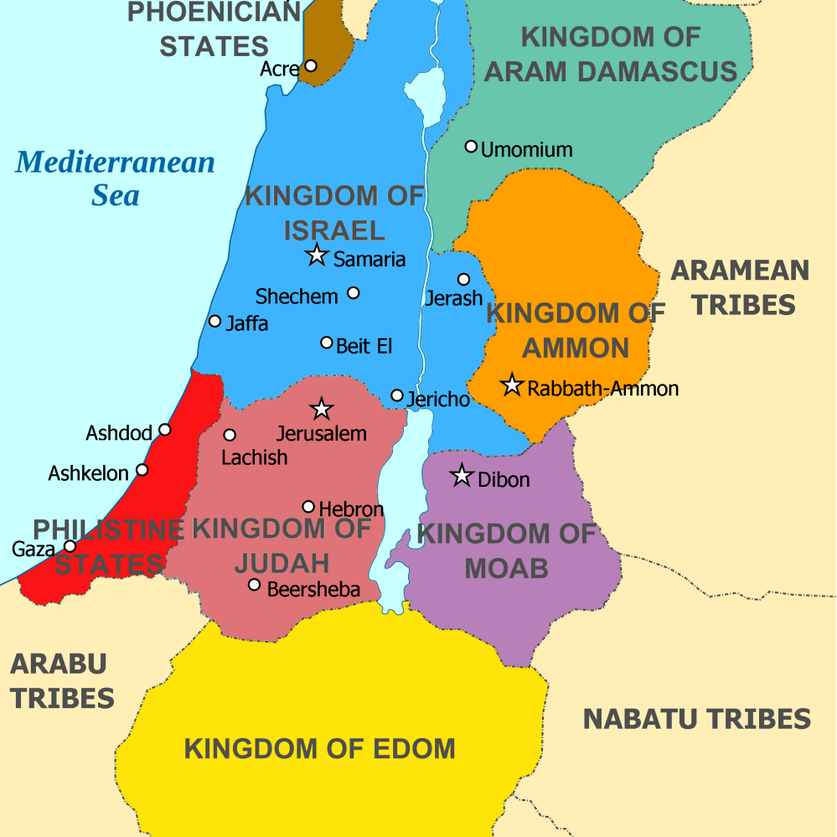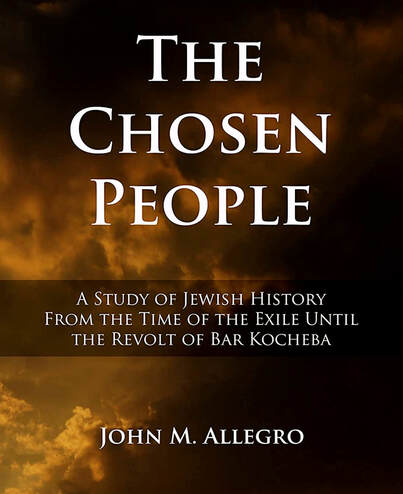The Chosen People
by John Marco Allegro
by John Marco Allegro
|
|
The Israelite religion of the post-exilic years was a very different thing from that which had preceded the catastrophe of 587 BC - John Allegro
|
|
|
|
Superiority
Allegro’s purpose in this book is something quite different from a reiteration of his claims concerning fungus. His thesis concerns the dangers of religious exclusiveness and of pursuing a politics of separatism. The Babylonian Exile forged among the Jews a “new philosophy of racial and religious exclusiveness.” Expressed in the doctrine of the “Chosen People,” who had a special relationship with the deity, purity became the obsessive concern - J. A. Donovan (Introduction) Babylonian Influence The capture and destruction of Jerusalem was a watershed in the development of Israel, matched in importance only by the city’s catastrophic fall to the Romans some six hundred years later. In those intervening, ruthless years, the exclusive cult of Judaism that we know today was conceived and bred...It was born in blood and nourished in the agony of despair and loneliness. The dismemberment of her state and despoiling of her most sacred shrine bred into the Jewish soul a ruthless self-assertiveness that has spared neither her own people nor those she has proclaimed her enemies. When the Babylonian prince dragged the flower of the Jewish nation to an alien soil in Mesopotamia, he created Judaism and the Jewish problem. Anti-Semitism ..the Babylonian exile of the Jews in the sixth century B.C. played a decisive part in the formation of what we call Judaism, and that thereafter the distinctive features of the cult - John Allegro These terrible walls that Nehemiah and Ezra build around Judaism in the fifth century before our era have lasted until the present day. Unwittingly the master-planners of Babylon and their administrative and religious executors laid the foundation of an anti-Semitism which was thenceforth to blot the pages of human history. Allegro documents a vivid example of the manner in which a project to define oneself in opposition to the Other inevitably generates antagonism - J. A. Donovan The Bible No people have received so much attention from historians, philosophers, and theologians as the Jews. For all that, their ethnic and cultural origins have remained shrouded in mystery, largely because the main source of information, the Bible, is self-contradictory in this regard. The Hebrew and Aramaic writings that are contained within the biblical corpus come from a wide area of space and time, and the unity that has been impressed upon them derives largely from the wishful thinking of the Jewish theologian of a comparatively late date. The task of sifting fact from fancy, history from pious hero-worship, becomes increasingly difficult as the heterogeneous nature of biblical traditions becomes more evident. The Yahweh Fraud the pious belief of later Judaism and Christianity that Yahweh/Jehovah was from the beginning a “pure” desert god, utterly opposed to the popular fertility cults of contemporary Canaan, was quite false. Phallic Gods Many of the other divine names of the ancient Near East were similarly sexually oriented, all bearing witness to the original fertility concepts of the religions of this homeland of man’s earliest civilizations. The very common Semitic El, in its various forms, has a similar connotation, and cognate names such as Ba’al and Hadad, Seba’oth (the Hindu Siva), and the like, refer to the male organ of generation with which the god was mythologically identified. The name Yahweh (its purposeful mispronunciation as “Jehovah” was intended to preserve its secrecy from the uninitiated) turns out to have been merely a dialectal form of the Greek god-name Zeus, and both meant “spermatozoa,” the source of all life.
Ancient Drug Cults The discovery of the ancient cult of the sacred fungus, whose hallucinatory properties the gave the priest and prophet the fancied belief that they could communicate with the divine source of life, has at last given the key by which ancient Israelite mythology can be positively related to the oldest strata of Near Eastern culture. The cap of the mushroom, the Amanita Muscaria contains a hallucinatory drug which imparts a sense of euphoria, coupled coupled with violent physical energy, followed by periods of acute depression. This cult was as old as the name Yahweh, and similarly derived from the Sumerians. Babylonian Release When the exiles were allowed to trickle back to their homeland, following the fall of Babylonia in October 539 B.C. to the armies of the Persian Cyrus, they found barriers of sullen hostility had replaced the walls thrown down by Nebuchadnezzar. Their lands and houses had been taken over by the peasants the invaders had left undisturbed. To the south Edomites, forced northward through incursions from Arabia, had moved into King David’s proud land of Judah; to the north the Samaritan aristocracy, claiming suzerainty over the remainder of the land, actively resented the return of the Jewish nobility to challenge their power. Racial Purge She had compromised her religious purity by accepting foreigners with their syncretistic worship in her midst. Only by purging the community anew of these alien elements could her cultic innocence be restored. No sacrifice was too great to achieve this end. Loving husbands must banish their foreign wives and children from their homes. Jewish women must leave their gentile husbands and forsake their offspring. offspring. Only when the nation had purged itself racially would Yahweh fulfill his promises conveyed through the prophets. Then, as the Elect of God, they could turn their undivided attention to rebuilding the Temple, as the prophet Haggai demanded. The Second Temple In March 515 BC, a Temple of sorts was in fact completed and dedicated with great rejoicing. Seventy years later affairs in Jerusalem were no better. Political pressure upon the city state had increased from the north and south; morale was low and was reflected in cultic and moral laxity. Racial discrimination was breaking down again and intermarriage becoming common. Hellenization Prevents Judaism's Fall Antiochus determined to press this Hellenization of Jerusalem even further. Perhaps, had he waited, exclusive Judaism might have died a natural death and crumbled away as effectively as the broken walls that symbolized her hard-won autonomy. But, impatient of pockets of conservatism that resisted his changes, Antiochus decreed the cancellation of the special rights and privileges of the Jews and in effect forbade the practice of distinctive Judaism. Regular sacrifices were suspended, the observance of the Sabbath and traditional festivals forbidden, circumcision of children made a crime, and copies of the Law were ordered to be destroyed. Pagan altars were erected throughout the territory and Jews were forced to participate in the attendant rites and to eat swine’s flesh.
Push Back Mattathias and his five sons, John, Simon, Judas, Eleazar, and Jonathan, took to the hills and began to harass the occupying forces by guerilla action. Judas Maccabeus Mattathias died in the following year, 166 BC, and leadership passed to his third son, nicknamed “The Hammer,” Maccabeus. A new dynasty of rulers had arisen in Israel. The religious religious and political autonomy that had been previously sought from the dominant powers by diplomacy, bribery, and voluntary submission, was for a century to be won and held by force of arms. A father and five sons, backed by a motley crowd of fanatical guerilla fighters, had routed professional Greek troops. They had lain in wait in rocky defiles, pounced and seen the enemy run for his life, leaving rich booty for the taking. By 164 BC, Judas was able to restore Jerusalem’s defenses and garrison the city with his troops. The Greek army withdrew after promising Judas and his friends freedom to worship in accordance with their traditions...the immediate battle had been won; Judaism had its own undefined cultic center and its pious devotees could practice their religion undisturbed within the political structure of an alien empire.
Enter the Romans Roman power was of a very different category from that of the crumbling Seleucid empire...Never again were the Jews to win political autonomy such as that achieved by Judas and his brothers. In 63 BC, Pompey completely reorganized Syria-Palestine as a Roman province under a governor. The Maccabean kingdom was divided up. In 40 BC, the Roman Senate appointed Herod king of Judea and three years later he was able to take possession of his kingdom and the then desolated city of Jerusalem. Herod the Great Herod was undoubtedly a great king. He was a master of diplomatic trickery and a builder on a huge scale in both civil and military undertakings. He lived and loved and massacred in the grand manner. He was the epitome of an oriental despot. But he was no Judas Maccabeus; indeed, he was but half a Jew. His reconstructed Jerusalem, of which the Temple was the crowning glory, was a showpiece to the world, built to the everlasting glory of Herod, not Yahweh. The religious circles of Jerusalem could not feel at ease under his rule, however great the material benefits it brought the city and the Temple clergy. He was a friend of Rome, a foreigner, and as such despised. His death in 4 B.C. was the signal for an outbreak of rioting, directed as much against Rome as Herod’s successors. Herod Agrippa later on, another Herod, called Agrippa, obtained the kingship over practically the whole territory formerly controlled by his grandfather, and even tried to extend and refortify Jerusalem, he was never accepted by the religionists of the city as anything more than a tool of the hated Roman overlords. Much as he played the part of a devout Jew and a generous benefactor of the cult while in the city, outside Jerusalem he behaved no differently from any other rich Hellenistic king, glorying in regal ostentation and lavishly sponsoring the pagan arts. At Agrippa’s death in A.D. 44, unlamented by his Jewish subjects, the whole of his territory reverted to a procuratorial province, ruled by governors living in Caesarea. The stage was now being set for the last bloody conflict. Jewish Revolt It was around these so-called “Zealots” that the revolt of A.D. 66 exploded, and they were the malevolent power that directed its end remorselessly to the destruction of the nation. For no angelic legions swooped from on high to blast the Roman armies. The walls of Jerusalem fell before the siege engines, and the August sky of A.D. 70 darkened with the smoke of the burning Temple. The Zealots who escaped the funeral pyre of Judaism and fought their way back to Herod’s fortress by the Dead Sea died by their own hands three years later.
Fall of Judah Ill-conceived rebellions by Jewish kings, in 601 and 588 BC, brought a final dissolution of the state. In July 587 BC, the walls of Jerusalem fell. ...we have very little firsthand evidence of life in Judah during the fifty years of the Exile. Archaeological excavations have shown that the Babylonian invasion razed most of the important towns in the Judean hill country and the western slopes...the population was decimated by war, plague, or deportation. Of the survivors, some thought it best to migrate voluntarily, and one group from Jerusalem, despite Jeremiah’s protests, took off for Egypt, dragging their unwilling prophet of doom along with them. Of the survivors, some thought it best to migrate voluntarily, and one group from Jerusalem, despite Jeremiah’s protests, took off for Egypt, dragging their unwilling prophet of doom along with them
the Egyptian Jews were to form one of the most important and influential centers of world Jewry, rich and powerful enough to play a significant significant part in imperial politics. |
|
|
|
Devastated Nation
After the holocaust and upheaval that followed, some refugees drifted back, but the dispirited nature of their existence can be gauged from the biblical book of Lamentations. ...their cult continued to be of the “unreformed,” fertility variety, including sacred prostitution and dedication of semen to Molech.
Nebuchadnezzar had taken the aristocracy from Jerusalem for deportation to Babylonia. They represented the elite of the population materially and intellectually and were comparatively few in number.
The Reign of Herod the Great Herod realized that he must make a bid for the affections of the people if he was to continue in power; he must become somehow more identified with Judaism and the Jews, even though it meant suppressing his traditional traditional Arab contempt for the race. Much of his subsequent extravagant glorification of things Jewish, particularly his grandiose building schemes, such as the reconstruction of the Jerusalem sanctuary, stems from his trying to be more Jewish than the Jews, another David, Solomon, and Judas Maccabeus, rolled into one. It was perhaps his failure in this regard that, more than any other cause, drove him eventually to the homicidal mania that destroyed his family and himself.
...at the end of 40 BC, Herod was appointed king of the Jews by the Roman Senate...It was, however, one thing to be proclaimed king of the Jews by the Roman Senate, and another actually to take over the kingdom...He had thus to fight his way back every inch of the way, and it was only after two years of bitter struggle, largely against his intended subjects and with the aid of the Romans, that Herod reigned triumphant in Jerusalem, or what was left of it. The Zealots The name “Zealots,” Hebrew Qannaim, is but a word-play on another of the names of the sacred mushroom. Our recent researches have demonstrated that behind the fungus word lies a Sumerian phrase meaning “arched canopy, stretched across the heavens,” a reference to the characteristic “umbrella” shape of the mushroom cap. The viciousness which characterized the Zealots, and which made them feared and hated by Jew and Roman alike, probably owed much to the stimulation of the drugs they obtained obtained from the cap of their sacred fungus...it has recently been suggested that it is this fungus which is given divine honors as the soma plant of the Rig-Veda hymns. The fungus was always held in awe by the ancients, not least because of the strange manner of its conception without seed (i.e. its “virgin birth”) and its speedy expansion from the “volva” in the form of the human phallus, erecting under sexual stimulus...it was known that if two or three of the caps were eaten, the poisons contained contained under the white “warts” would give the subject a variety of strange sensations, ranging from mild euphoria and hallucinations, to a raging passion of sex-and blood-lust...the Bacchus/Bacchus/Dionysus god the Maenads worshiped and ate was the red-topped mushroom, and the same identification can now be made of the original “Lord’s Supper” of the equivalent rite of early Christianity. It is also the original “nectar,” the food of the gods. The Zealots and their followers were simply instruments of Yahweh. If they spared no one, man, woman, or child, in their preparation for the Day of the Lord, the suffering thus inflicted was no more than any Jew must expect before the dawn of the new Kingdom of God. In any case, death, according to their philosophy, was to be welcomed as a blessing, a means for the release of souls to experience the freedom of their proper existence. It would seem, then, that the “Zealots” and the “Sicarii” are one and the same, and that early Christianity was closely connected with this revolutionary movement. For in those days the Sicarii banded together against those who consented to submit submit to Rome and in every way treated them as enemies, plundering their property, rounding up their cattle, and setting fire to their dwellings; protesting that such persons were no other than aliens, who so ignobly sacrificed the hard-won liberty of the Jews and admitted their preference for the Roman yoke - Josephus
...the old fungus cult was not so easily suppressed, but continued underground as a mystery religion transmitted secretly between between initiates sworn to silence about the central features of their faith. ...the cult of the sacred fungus was not confined to old Israelitism and its latter-day manifestations; it lies at the heart of many of the Asian mystery cults, such as the Bacchic worship previously mentioned. The narcotics were thought to effect that release of the soul from its mortal “cage” so much desired by the prophet of old. While they remained in their monastic communities, muttering their incantations and prophecies to each other, little little harm was done. But when others began to believe the stories of their occult powers and look to them for guidance, they became a positive danger to the political stability of the country. |
|


